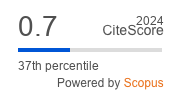Contraception as a Risk Factor of Trichomonas vaginalis Infection Among Women Attending Outpatient of Al-Batool Teaching Hospital for Maternity and Children-Baqubah-Iraq
DOI:
https://doi.org/10.47723/kcmj.v13i1.117Keywords:
Contraception, Trichomonas vaginalis Hhigh vaginal swabAbstract
Background:The effects of contraception on Trichomonas vaginalis have important implications for women who suffer from infections associated with disruptions in the vaginal ecology, such as bacterial vaginitis and urinary tract infections.
Objective: To find the association of the common types of contraceptions with the Trichomonasvaginalis infection in women admitted to the Al-BatoolTeaching Hospital for Maternity and Children in Baqubah city.
Type of study: Cross-sectional study
Methods: This study consist of 75 women with contraception use and71 apparently healthy non contraception user women admitted to outpatient in Al-Batool Teaching Hospital for Maternity and Children in Baqubah City, Diyala. Iraq during the period from 1st January 2016 till 31th December 2016. After full history and clinical examination, high vaginal swab took from posterior fornix of vagina and general urine examination, all samples were examined by wet mount preparation under the microscope for the presence of Trichomonas vaginalis and gram-stained smears for the presence of Candida albicans, then all results were recorded.
Results:. Minimum age was 18 year and maximum was 47 year, infection rate of Trichomonas vaginalis was 41(45.66%) among contraception user and 6(8.45%) among contraception non- user while Candida albicans was 18(24%) and 1(1.40%) respectively, the highest frequency of infection 23 cases was diagnosed in the age group (29-39 year) among contraception user while 4 cases in age group (18-28) contraception non-user. On the other hand there was no significant correlation between age, parity, duration of marriage and infection and using of contraception. Marginal significant correlation between the type of contraception and infection with Trichomonas vaginalis. While no significant correlation between types of contraception, infection and duration of contraception use.
Conclusion: Infection with Trichomonas vaginalis significantly correlated to use of intrauterine contraceptive device and combined oral contraceptive pills, so great attention should be paid to those women for diagnosis and treatment.













